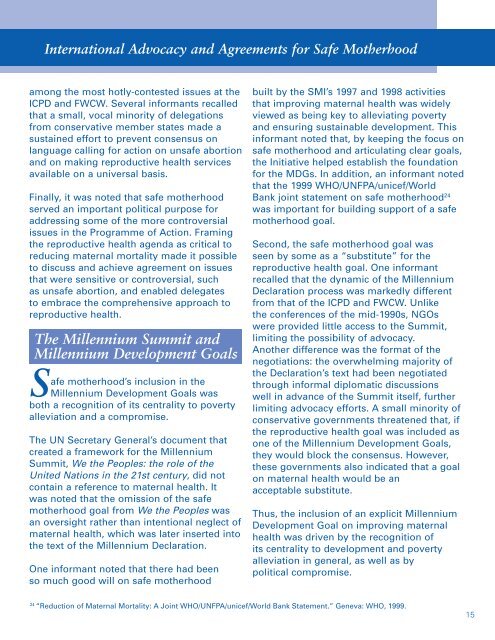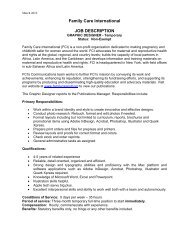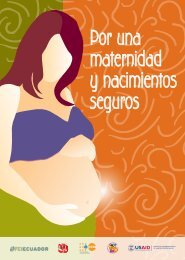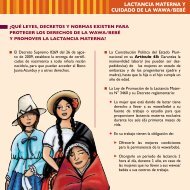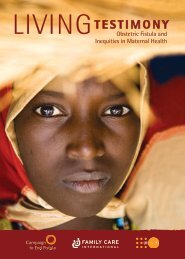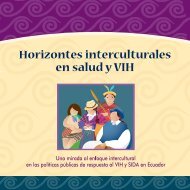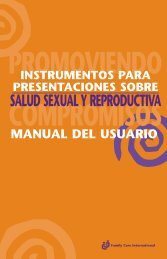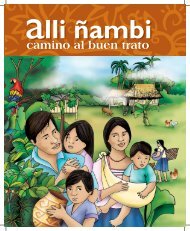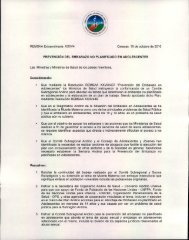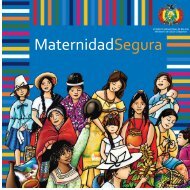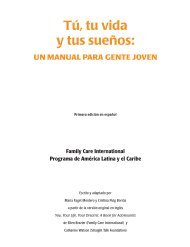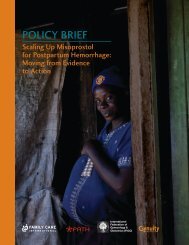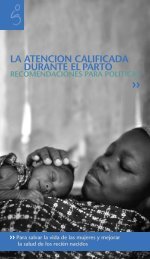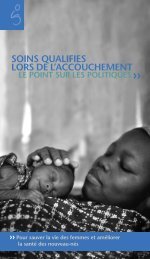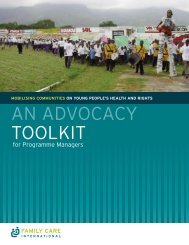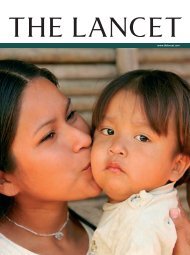Safe Motherhood: A Review - Family Care International
Safe Motherhood: A Review - Family Care International
Safe Motherhood: A Review - Family Care International
You also want an ePaper? Increase the reach of your titles
YUMPU automatically turns print PDFs into web optimized ePapers that Google loves.
<strong>International</strong> Advocacy and Agreements for <strong>Safe</strong> <strong>Motherhood</strong><br />
among the most hotly-contested issues at the<br />
ICPD and FWCW. Several informants recalled<br />
that a small, vocal minority of delegations<br />
from conservative member states made a<br />
sustained effort to prevent consensus on<br />
language calling for action on unsafe abortion<br />
and on making reproductive health services<br />
available on a universal basis.<br />
Finally, it was noted that safe motherhood<br />
served an important political purpose for<br />
addressing some of the more controversial<br />
issues in the Programme of Action. Framing<br />
the reproductive health agenda as critical to<br />
reducing maternal mortality made it possible<br />
to discuss and achieve agreement on issues<br />
that were sensitive or controversial, such<br />
as unsafe abortion, and enabled delegates<br />
to embrace the comprehensive approach to<br />
reproductive health.<br />
The Millennium Summit and<br />
Millennium Development Goals<br />
<strong>Safe</strong> motherhood’s inclusion in the<br />
Millennium Development Goals was<br />
both a recognition of its centrality to poverty<br />
alleviation and a compromise.<br />
The UN Secretary General’s document that<br />
created a framework for the Millennium<br />
Summit, We the Peoples: the role of the<br />
United Nations in the 21st century, did not<br />
contain a reference to maternal health. It<br />
was noted that the omission of the safe<br />
motherhood goal from We the Peoples was<br />
an oversight rather than intentional neglect of<br />
maternal health, which was later inserted into<br />
the text of the Millennium Declaration.<br />
One informant noted that there had been<br />
so much good will on safe motherhood<br />
built by the SMI’s 1997 and 1998 activities<br />
that improving maternal health was widely<br />
viewed as being key to alleviating poverty<br />
and ensuring sustainable development. This<br />
informant noted that, by keeping the focus on<br />
safe motherhood and articulating clear goals,<br />
the Initiative helped establish the foundation<br />
for the MDGs. In addition, an informant noted<br />
that the 1999 WHO/UNFPA/unicef/World<br />
Bank joint statement on safe motherhood 24<br />
was important for building support of a safe<br />
motherhood goal.<br />
Second, the safe motherhood goal was<br />
seen by some as a “substitute” for the<br />
reproductive health goal. One informant<br />
recalled that the dynamic of the Millennium<br />
Declaration process was markedly different<br />
from that of the ICPD and FWCW. Unlike<br />
the conferences of the mid-1990s, NGOs<br />
were provided little access to the Summit,<br />
limiting the possibility of advocacy.<br />
Another difference was the format of the<br />
negotiations: the overwhelming majority of<br />
the Declaration’s text had been negotiated<br />
through informal diplomatic discussions<br />
well in advance of the Summit itself, further<br />
limiting advocacy efforts. A small minority of<br />
conservative governments threatened that, if<br />
the reproductive health goal was included as<br />
one of the Millennium Development Goals,<br />
they would block the consensus. However,<br />
these governments also indicated that a goal<br />
on maternal health would be an<br />
acceptable substitute.<br />
Thus, the inclusion of an explicit Millennium<br />
Development Goal on improving maternal<br />
health was driven by the recognition of<br />
its centrality to development and poverty<br />
alleviation in general, as well as by<br />
political compromise.<br />
24 “Reduction of Maternal Mortality: A Joint WHO/UNFPA/unicef/World Bank Statement.” Geneva: WHO, 1999.<br />
1


